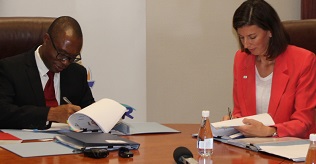
N$2 billion German loan to assist with the upgrades, construction of key water and road infrastructure

The government and German partners this week inked a loan agreement worth around N$2 billion for the construction and rehabilitation of key water and road infrastructure locally to foster economic development.
This was revealed in a joint statement by the two governments, adding that the loans will be used to fund the Direct Potable Reclamation Plant II (DPR 2) in the central area of Namibia and the Namibian Water Sector Support Program (WSSP) to help safeguard the country’s water supply.
The agreements fit within the programme of financial cooperation. Moreover, these projects are co-financed by German Development Cooperation, through the KfW Development Bank, and through concessional loans.
The signing ceremony which was held on 13 December was attended by the Minister of Finance and Public Enterprises, Iipumbu Shiimi, CEO of NamWater, Abraham Nehemia, CEO of Roads Authority (RA), Conrad Lutombi, and Beatrice Lucke, Country Director to Namibia of the German Development Bank, KfW.
A concessional loan of N$746 million, helping to secure the water supply for the central area of Namibia through the construction of DPR 2, was signed.
“As the driest country in Sub-Saharan Africa, with more than 80% of its land area covered by desert or semi-desert, Namibia regularly experiences extreme and prolonged periods of drought. This results in a highly sensitive water supply situation for the country and the Windhoek central area which requires precise demand management, management of existing water resources as well as urgent development of new ones.”
In addition, a second concessional loan of N$932 million was signed to support the WSSP, according to a joint statement by the two governments.
Meanwhile, the government has recognized the importance of transportation in its strategic objective set out in the NDP5 and HPP2.
“This is to become a logistics hub in the SADC region. Despite the massive investments in transport infrastructure over the last decade, funding needs are still huge due to aging roads, underserved rural areas, and insufficient funds for maintenance,” according to the joint statement
With total support of around N$373 million, signed by the government, RA, and the KfW, the government will undertake the rehabilitation and upgrade of the B2 section between Usakos and Karibib. As a result, this will form part of the Trans-Kalahari Corridor and the Walvis Bay-Ndola-Lubumbashi Development Road.
“This road rehabilitation contributes to the economic objective of having a well-functioning and high-quality transport infrastructure connected to the most important local and regional markets as well as to the port of Walvis Bay,” reads the statement. Further, the road will be upgraded to a 2 (plus) one (1) grade similar to Okahandja Karibib Road.
Though the plan is for DPR II to be implemented by NamWater at the same time as upgrade works are carried out for the City of Windhoek wastewater treatment plants. Accordingly, this will increase the amount of water that can be reused, allowing for up to 50% of Windhoek’s water supply to come from the two Direct Potable Reclamation Plants.
“In the late 1990s, when the first Old Goreangab Water Reclamation Plant from 1958 came to the end of its lifespan, KfW, on behalf of and with funds of the German Ministry for Economic Cooperation and Development, financed the country’s first reclamation plant, New Goreangab Water Reclamation Plant (DPR 1), which today provides Windhoek with up to 25% of its drinking water.”
The stretch of 33km will be resurfaced and extended to allow for improved traffic flow and road safety. Construction works are planned to start in the second half of 2023. “RA and KfW are particularly proud to include local companies in the construction, allowing Namibian SMEs to implement at least 25% of the contract amount,” the statement read.
Additionally, since 2016, KfW funds for the expansion and maintenance of corridor roads through concessional loans. Large parts of the main corridor roads are being rehabilitated and partly extended to contribute to the economic development of the country.
To date, the construction of more than 1800 km of roads has been co-financed by Germany through KfW in close cooperation with the government through RA.









































